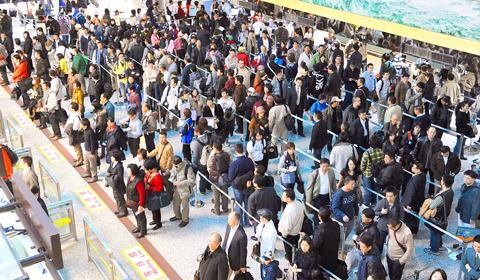Immigration officials at Taiwan Taoyuan International Airport scrambled to hand-record travel information for thousands of passengers yesterday after the National Immigration Agency (NIA) computer system crashed.
The NIA’s main and backup systems experienced sporadic malfunctions throughout the day. At press time, the system was undergoing repair and was not expected to be back online until noon today, NIA Deputy Director-General Huang Bi-hsia (黃碧霞) said.
Kaohsiung International Airport and Kinmen Airport, which mostly caters to passengers traveling to China via the three mini-links, also reported system malfunctions.

PHOTO: YAO KAI-SHIOU, TAIPEI TIMES
The NIA cited faulty computer hardware, but said the main computer system at the agency was working normally, though it was not accessible at the airport.
The hardware had been replaced and the agency would have more information about the nature of the problems once they were resolved, Huang said.
The Central News Agency reported that the NIA had recently terminated its contract with its computer system maintenance company, which was replaced on Thursday.
The report suggested that a bug could have been planted by a disgruntled individual.
All travel documents were being hand-checked by immigration officers yesterday, causing long lineups and leaving thousands of passengers frustrated. Officers wrote down passengers’ travel information, which the NIA said would be entered into the system once the computers had been fixed.
Taiwan Taoyuan International Airport opened 40 immigration windows to handle the backlog of passengers, Huang said.
Repair work began immediately after the system malfunction was discovered at 6:45am, a peak travel hour. Technicians were still battling with the problematic hardware at 2pm, Huang said.
Yesterday was a particularly busy travel day as the first working day following the four-day New Year holiday weekend.
Many passengers feared delays would prevent them from making connecting flights, but the NIA said no passengers had missed their flights because of the glitch.
Huang acknowledged the breakdown could result in a security breach, and said the NIA would not be able to ascertain whether anyone had slipped in or out of the country illegally until the system was up and running.
As of 1pm yesterday, approximately 20,000 people had exited the country through Taiwan Taoyuan International airport.
Minister of the Interior Liao Liou-yi (廖了以) and NIA Director-General Hsieh Li-kung (謝立?urveyed the situation at the airport yesterday afternoon and stayed for 20 minutes after being updated on the situation by airport officials.
One day earlier, hundreds of travelers departing from Taiwan Taoyuan airport on 11 different flights had to leave without their checked-in luggage when a conveyor belt broke down for almost two hours.

WAITING GAME: The US has so far only offered a ‘best rate tariff,’ which officials assume is about 15 percent, the same as Japan, a person familiar with the matter said Taiwan and the US have completed “technical consultations” regarding tariffs and a finalized rate is expected to be released soon, Executive Yuan spokeswoman Michelle Lee (李慧芝) told a news conference yesterday, as a 90-day pause on US President Donald Trump’s “reciprocal” tariffs is set to expire today. The two countries have reached a “certain degree of consensus” on issues such as tariffs, nontariff trade barriers, trade facilitation, supply chain resilience and economic security, Lee said. They also discussed opportunities for cooperation, investment and procurement, she said. A joint statement is still being negotiated and would be released once the US government has made

NEW GEAR: On top of the new Tien Kung IV air defense missiles, the military is expected to place orders for a new combat vehicle next year for delivery in 2028 Mass production of Tien Kung IV (Sky Bow IV) missiles is expected to start next year, with plans to order 122 pods, the Ministry of National Defense’s (MND) latest list of regulated military material showed. The document said that the armed forces would obtain 46 pods of the air defense missiles next year and 76 pods the year after that. The Tien Kung IV is designed to intercept cruise missiles and ballistic missiles to an altitude of 70km, compared with the 60km maximum altitude achieved by the Missile Segment Enhancement variant of PAC-3 systems. A defense source said yesterday that the number of

‘CRUDE’: The potential countermeasure is in response to South Africa renaming Taiwan’s representative offices and the insistence that it move out of Pretoria Taiwan is considering banning exports of semiconductors to South Africa after the latter unilaterally downgraded and changed the names of Taiwan’s two representative offices, the Ministry of Foreign Affairs (MOFA) said yesterday. On Monday last week, the South African Department of International Relations and Cooperation unilaterally released a statement saying that, as of April 1, the Taipei Liaison Offices in Pretoria and Cape Town had been renamed the “Taipei Commercial Office in Johannesburg” and the “Taipei Commercial Office in Cape Town.” Citing UN General Assembly Resolution 2758, it said that South Africa “recognizes the People’s Republic of China (PRC) as the sole

Taiwanese exports to the US are to be subject to a 20 percent tariff starting on Thursday next week, according to an executive order signed by US President Donald Trump yesterday. The 20 percent levy was the same as the tariffs imposed on Vietnam, Sri Lanka and Bangladesh by Trump. It was higher than the tariffs imposed on Japan, South Korea and the EU (15 percent), as well as those on the Philippines (19 percent). A Taiwan official with knowledge of the matter said it is a "phased" tariff rate, and negotiations would continue. "Once negotiations conclude, Taiwan will obtain a better